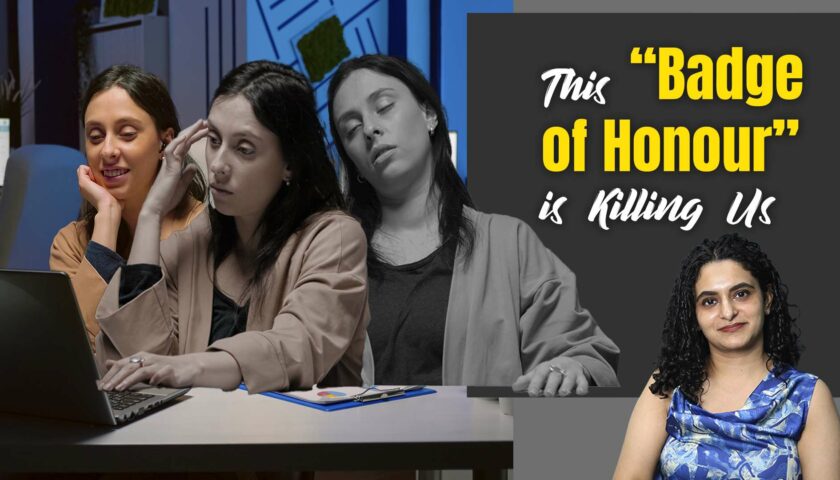September 2025, Mumbai, India : It begins with applause. A young startup founder is celebrated on stage for building her company into a unicorn. The crowd claps as she recalls pulling all-nighters, skipping meals, and working 16-hour days for months. Social media labels her “hustle queen.”
But what happens when applause dies down and exhaustion creeps in? When “work ethic” silently morphs into workaholism, the addiction society praises instead of treating?
The Hidden Cost of Hustle Culture
In India, long hours and “hustle culture” are often worn as badges of honor. Yet research shows they silently erode mental and physical health.
What’s really happening
Workaholism is not simply working hard; it’s an addiction driven by compulsion, guilt, and the inability to disconnect. Left unchecked, it leads to chronic stress, depression, insomnia, strained relationships, and even physical illness.
Unlike alcohol or drugs, workaholism hides in plain sight. India, with its deep cultural emphasis on hard work, often romanticises burnout as a badge of honour. But science tells a different story. Workaholism is linked to:
• Higher rates of depression and anxiety
• Insomnia and weakened immunity
• Strained relationships and intimacy breakdowns
In psychiatry, workaholism is increasingly being studied as a behavioural addiction where the reward pathway in the brain keeps chasing productivity “highs” much like substances.
The Hidden Costs
Behind every promotion and praise often lie panic attacks, irritability, hair-trigger tempers, and a creeping loss of joy. People describe living in “always-on” mode, answering emails at midnight, eating at their desks, and measuring self-worth by output alone. The body keeps the score: headaches turn chronic, sleep becomes shallow, blood pressure climbs, and intimacy suffers. What looks like discipline from the outside often feels like compulsion on the inside.
A Culture That Rewards the Problem
From startup pitch decks to corporate town halls, all-nighters are still romanticised. We applaud the “grind” and overlook the grief it causes at home, the missed milestones, the partner who eats alone, the child who calls the nanny “mumma” by mistake. When overwork is treated as loyalty, boundaries start to look like betrayal. That is how a culture normalises an addiction.
Dedication vs. Addiction
Dedication is chosen; addiction feels compulsory. The dedicated professional can switch off, rest, and return. The workaholic cannot. Weekends blur into weekdays, vacations feel guilt-ridden, and the mind is never fully present—at dinners, birthdays, or even during illness.
Ask yourself: Do I feel restless or ashamed when I’m not working? Do I equate rest with laziness? Do my closest relationships say I’m “never really there”?
Breaking the Silence
Workaholism often travels with perfectionism, anxiety, and ironically, imposter syndrome. Many high performers push harder to outrun self-doubt. Therapy rooms hear the same confession in different words: “If I stop, I’ll fall behind.” What if the opposite is true? What if pausing is how we stop the fall?
Why Psychiatric Intervention Helps
Coaching advice can set goals; psychiatric care treats the engine that keeps revving. Evidence-based psychotherapy (like CBT) helps unlearn toxic productivity beliefs, restructure routines, and stabilise sleep. Where anxiety or insomnia are severe, short-term, judicious medication can support recovery—no different than using a brace while a fracture heals.
“Ambition should expand your life, not consume it,” says Dr. Anjalika Atrey. “When your worth is shackled to output, the mind forgets how to rest. Treatment teaches it again.”
The Public & Workplace Role
Leaders and organisations can flip the script: model realistic hours, make off-hours truly off, measure outcomes (not online time), and reward sustainable performance. Colleagues can stop glamorising late-night hustle posts. Families can replace accusations (“you never care”) with boundaries and honest check-ins (“we miss you at dinner; what can we change together?”).
Caring Begins Within: How Dr. Anjalika Atrey Can Help
Dr. Anjalika Atrey is a Mumbai-based Consultant Psychiatrist specialising in work-related stress, addictions, and burnout. She offers discreet, evidence-based care to help high performers reclaim balance without losing ambition.
Her approach integrates:
• Diagnosis and management of anxiety, depression, insomnia, and burnout
• Cognitive-behavioural therapy and stress-regulation protocols
• Boundary-setting, sleep rehabilitation, and relapse-prevention planning
• Couple/relationship work to repair strain caused by overwork
• Judicious pharmacological support where clinically indicated
Where She Practices
• CRITICARE ASIA MULTISPECIALITY HOSPITAL – Juhu, Gulmohar Road, Andheri, Mumbai
• PHOENIX MULTISPECIALITY HOSPITAL – Chikoowadi, Borivali West, Mumbai
In her practice, every conversation is met with clinical competence and deep empathy without judgment, without labels. For those celebrated for their stamina, she offers a space to lay the armour down.
A Last Word
The world may still applaud the grind. Your body and the people who love you won’t. Real success is not how long you can go without rest, but how well you can live while you strive.
If you or a loved one is struggling with overwork, anxiety, or burnout, don’t wait in silence. Support is available—reach out via phone at +91 8108823569, email at [email protected], visitthepsychiatrist.in, or connect on Instagram@dr_anjalika_atrey. Taking the first step toward help can make all the difference, because your mental well-being matters.
Hope and healing are just a conversation away.




